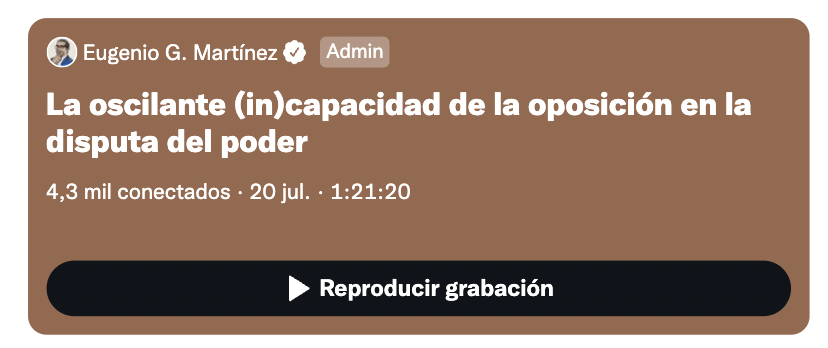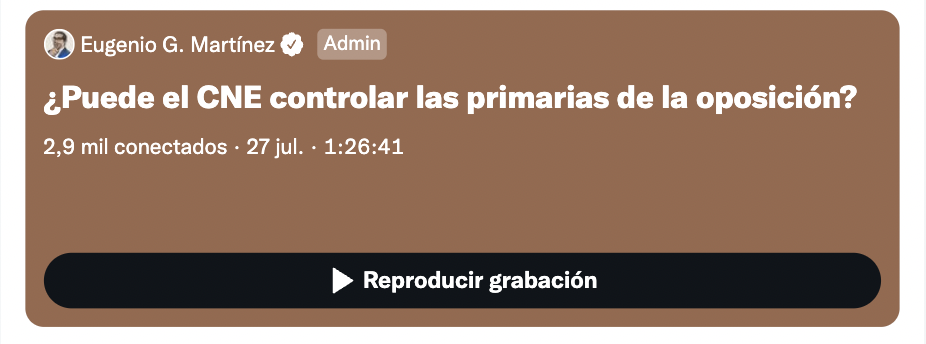| The constitutional continuity of the Venezuelan Interim Government led by Juan Guaidó is ensured as of January 5, 2022. However, this government lacks much more political support in the country than what Guaidó’s international allies might suppose and is subject to a redefinition of its functions. Based on our political outlook, the interim government of Guaidó relies on the national and international political support. Three years later, it only has part of the international support, while national support is diluted due to the absence of concrete results, allegations of corruption or imposed agendas. However, despite the lack of support by most of the political forces and the civil society, there is no legal or political alternative that is feasible to maintain Venezuelan foreign asset management, and especially to address the remaining litigations on these assets. Similarly, there is no feasible alternative for the political leadership of the opponents to Nicolás Maduro, although in recent hours the US Ambassador to Venezuela, James Story, has stepped up his efforts to achieve the integration of critics to Guaidó’s continuity and the roadmap designed by Leopoldo López into the Venezuela’s Unity Platform. Up to the time of drafting this report, these efforts have been fruitless, especially because the thesis that Guaidó must remain as the interim president permanently and that the National Assembly elected in 2015 may change him or remove the concept of Interim Government if deemed convenient drives away any possible understanding. An annual debate The debate on the continuity of the Interim Government and of the Interim Presidency of Juan Guaidó took place for the first time in December 2020, when the constitutional period of the National Assembly elected in 2015 was coming to an end. At that time, it was necessary to reform the Statute governing the Transition, with strong criticism from the Democratic Action party and with a questionable procedure to call deputies and votes to approve the reform extending the interim government mandate for 12 months. A year later, the debate is held once again, but with vehement political contestation and less unity to support Guaidó. Under article 13 of the reform of the Statute governing the Transition of 2020, the Delegated Committee of the National Assembly until the holding of true elections in 2021 or until the end of the legislative constitutional term. The chairing of the Delegated Committee by the Board of Directors of the National Assembly has led to a legal discussion on whether the plenary of the National Assembly (elected in 2015) must be convened for January 5, 2022 or whether the interim regime remains unchanged at least until January 2025. Guaidó, López, and the members of Popular Will party regard this plenary as unnecessary. However, the main problem that Guaidó is facing to convene this plenary -beyond legal interpretation- is the lack of enough votes so far to maintain the structure of the interim government. The lack of political support from the main political opposition parties (Democratic Action, a New Era, and Justice First) to the continuity of the Interim Government, although not necessarily to the presidency, has led to the proposal for three consecutive weeks of the debate in parliament and the non-existence of a concrete date of the plenary session required to formalize the Statute governing the Transition. The main legal argument put forward by Leopoldo López and the Interim Government at this moment is focused on explaining that in the absence of free, fair and true elections, Juan Guaidó should continue to serve as Interim President leading the institutional debate to the international allies on the dilemma about whether to support Guaidó or Maduro. However, this is not a mere legal discussion and is subject to the useful nature of the interim government in the current and future strategy of the Venezuelan democratic forces. Barring any sudden switch in plans, the group promoting the continuity of the interim government seem to lack the political support to achieve an extension within the parliament. The reform that rejects the interim government Justice First party, advocated by the former foreign minister of the Interim Government Julio Borges, is seeking the approval of the continuity of the Interim Government but significantly reducing the bureaucracy created for the past two years. This proposal (unofficially endorsed by AD and UNT parties) seeks to reduce the diplomatic missions, which are representatives of the National Assembly and are maintained and funded by the Interim Government in 40 countries. This proposal (rejected by Guaidó and the Popular Will party) involves the reduction of this representation to the Organization of American States, Brazil, Colombia, the United Kingdom (due to hearings over gold in London), the European Union (based in Spain or France), and the United States. In addition, the reduction of presidential commissioners appointed by Guaidó has been proposed: Foreign Affairs, Human Rights, Economic Development, Humanitarian Aid, Commission against Terrorism and Organized Crime, and Assets Recovery. The bureaucracy payroll of the Interim Government ranges from 1,600 to 2,400 people according to any source used. This bureaucracy reduction proposed is rejected by the members of Guaidó’s diplomatic corp. In a meeting coordinated by the Ambassador to Canada, Orlando Viera-Blanco, and the diplomatic representatives in 40 countries, the 2022 international action agenda has been agreed, dismissing the reduction of the bureaucracy abroad. In fact, the resignation of the commissioner of foreign affairs of the Interim Government results in the removal of the salary cap for the ambassadors and the foreign service staff imposed by Borges three years ago. Borges’ decision led to bitter feuds with the members of the group of workers of the interim government abroad. In addition, the Interim Government is made up by other instances that must be audited as demanded by opponents. In this regard, the proposal of the Justice First party (rejected by Leopoldo López) is the removal of all Guaidó-dependent instances, excluding those that are key to effectively protect foreign assets. However, no agreement on these instances has been reached. • Interim presidency: it heads the Attorney Special’s Office that addresses litigations abroad, the board of directors of the 2016-2021 p.p1 {margin: 0.0px 0.0px 0.0px 0.0px; font: 11.0px Cambria} table.t1 {border-collapse: collapse} td.td1 {padding: 0.0px 5.0px 0.0px 5.0px} National Assembly and the Delegated Committee (made up of the presidents and vice-presidents of the 15 permanent commissions). • Ad hoc board of directors: is the board of directors appointed by Juan Guaidó and the 2016-2021 National Assembly to manage the interests of several companies and institutions of the Venezuelan State overseas. So far, the ad hoc board of directors have been appointed for the Central Bank of Venezuela, Pdvsa (Citgo), Pequiven (Monómeros), Bandes, the CVG, and the Venezuelan Petroleum Corporation. • Board of Directors of the Interim Government Expenditure: appointed by the National Assembly in March 2020 in order to draw up the budget of the Venezuela’s Liberation Fund; manage and organize the approval of the budget of the Liberation Fund by the National Assembly and request the OFAC licenses, and develop payment mechanisms. • Attorney’s Special Office and Comptroller’s Office: implemented in February 2020 and were tasked with the supervision of the operation of the ad hoc board of directors and the Attorney’s Special Office, including transparent management of the resources in the hands of the interim government. • 2016-2021 National Assembly: following the reform of the Statute governing the Transition put in place in December 2020, the plenary functions of the National Assembly were entrusted to the Delegated Committee, consisting of about 40 people including the Secretary, the board of directors, and the president and vice-president of the commissions. Its mission is to ensure the holding of free and fair presidential and parliamentary elections, and the creation of the mechanisms for massive humanitarian assistance of the population. • Magistrates in exile: there are 33 magistrates that were appointed by the plenary of the National Assembly in July 2017, but almost immediately were forced into exile. Nevertheless, they created a Supreme Tribunal of Justice in exile that has issued legal statements on different national matters, but lacking real impact in the country. They are the only Interim Government staff that did not receive emoluments throughout 2021. Barinas is Venezuela p.p1 {margin: 0.0px 0.0px 0.0px 0.0px; font: 11.0px Cambria} table.t1 {border-collapse: collapse} td.td1 {padding: 0.0px 5.0px 0.0px 5.0px} The PSUV has changed the repetition of the gubernatorial elections in Barinas state into a plebiscite. Beyond the symbolic value of the entity for chavistas, it should be noted that this state is a geopolitical corridor and a guerilla seat in Venezuela. From a political-electoral view, Barinas provides an overview of what can happen in Venezuela in an election process compromising Maduro’s tenure: Military control of vote counting and issuance of results, candidate disqualification, resulting standards, other State branches’ intervention in the electoral process, use of public resources, and chavistas and military sectors’ denial to surrender the power to Popular Will. Evidently, for the PSUV, especially for the so-called original chavistas sector (led by Diosdado Cabello), Barinas is a symbol that cannot be lost, let alone handed over to the party representing Leopoldo López. To understand the symbol that original chavistas grant to Barinas, it is worth recalling that, apart from being the birth place of Hugo Chávez, the Chávez family has controlled the governorate of the state since 1998. Between 1998 and 2008 Hugo de los Reyes was the governor of the state; followed by Adán Chávez (brother) between 2008 and 2017, and Argenis Chávez (brother) between 2017 and 2020. The symbol of Barinas for this sector of original chavismo is of such weight that for the first time in 20 years all the military high command (the Higher Staff or the Bolivarian National Armed Force) moved to Barinas to commemorate the Battle of Santa Inés. This battle occurred in 1859 during the Federal War and historically was never considered decisive, but Hugo Chávez transformed it into one of the main military feats of the country to shore up its narrative of land expropriation. The unusual military presence to commemorate the Battle of Santa Inés includes the transfer to Barinas of the governors of Apure and Táchira states, the first vice-president of the PSUV (Diosdado Cabello), and 14 ministers. Also, the Military High Political Command of the Revolution has been instructed to move to the entity in connection with Christmas and New Year’s festivities. However, Barinas has another meaning for the military sector in the country. The state is a major geographical and geopolitical corridor in the military sphere through what is known as the “lengueta de Barinas. This corridor allows the control of the passage between the western plains and the area of Alto Apure, as well as including a relevant passage to Los Andes. Due to its geographical location, Barinas is the traditional venue of talks -and settlement- with Colombian insurgent groups. In essence, the main irregular group of the area is the so-called “Second Marquetalia”, a guerrilla group led by former FARC member Iván Marquez. In this regard, the chavista behavior does not only result from a symbolic issue, but also from the territorial control for its regional political project. Last but not least, the repetition of the elections in Barinas helps Maduro to continue his strategy of removing the Chávez family and any collaborator that may compromise his tenure from the political space of the country: Miguel Rodríguez Torres, Rafael Ramirez or Diosdado Cabello. Barinas proves that the circle of political and economic decisions of Maduro is still limited to the Jorge and Delcy Rodríguez brothers, Tarek El Aissami, and Arreaza. |
GUAIDÓ WILL CONTINUE, BUT WITH NO INTERNAL POLITICAL SUPPORT






